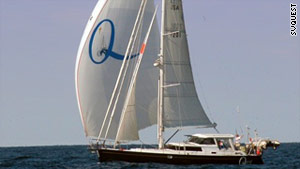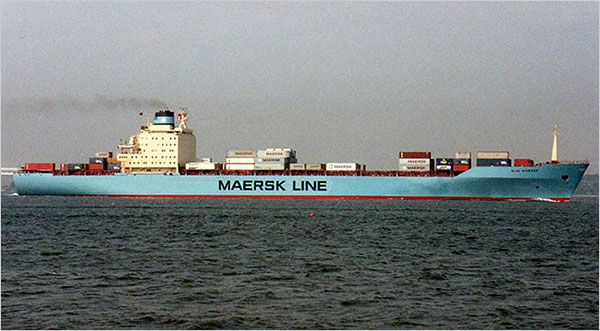The Category
In an op-ed in the Washington Post Donald Burgess pronounces that “piracy is terrorism”. He also takes a look at the legal morass facing countries that pursue pirates:
Prosecuting pirates puts enormous strain on a country’s legal system. A state whose ship was not attacked, and whose only involvement with the incident was as rescuer, might balk at being asked to foot the bill for lengthy and costly proceedings. Yet it might find itself forced to do so, if neither the victim’s nor the pirates’ state is willing. As Somalia has not had a recognized government since the early 1990s, the situation is all the more precarious for would-be capturers. The result is that ship owners, knowing that no rescue is imminent, pay the ransom. This emboldens the pirates further, and the problem worsens.
and he proposes a solution. Piracy is an international crime and should be prosecuted in the international criminal court:
Recognizing piracy as an international crime will do something else: It will give individual states that don’t want to prosecute pirates an alternative — the international court. If pirates are recognized under their traditional international legal status — as neither ordinary criminals nor combatants, but enemies of the human race — states will have a much freer hand in capturing them. If piracy falls within the jurisdiction of the international court, states will not need to shoulder the burden of prosecution alone.
The relationship between terrorism and piracy is a topic I’ve touched on before but, unfortunately, I think that Mr. Burgess has grasped the wrong end of the stick. The International Criminal Court has not yet proven itself an effective tool in dealing with the most serious international crimes. Its record is at best mixed although it has shown itself to be an effective sort of rest home in which genocidal thugs can spend their final days railing at the system, running out the clock.
Additionally, for something to become everybody’s responsibility is for it to become nobody’s responsibility. It reminds me of my dad’s frequent comment when I was a kid that if he had it to do over again he’d have named one of the kids “Somebody”. That way, if he asked for somebody to close the door, turn off the lights, or pick a toy up off of the floor, he’d get a response.
Piracy wasn’t reduced in the Caribbean and Atlantic because the crime was internationalized but because the United States and United Kingdom ordered their navies to prosecute pirates vigorously. The laws in those countries were adjusted to streamline the prosecution of pirates.
I don’t believe that pirates are terrorists nor that terrorists are pirates but that both are instances of a single category, in Cicero’s phrase hostis humani generis, enemy of humankind. Until we achieve a consensus that allows individual nations to prosecute these crimes wherever they are found vigorously both scourges are likely to become more problematic rather than less so.






Please don’t share Burgess’ equation of piracy with terrorism to the RIAA–they will send anyone who burned a copy of their U2 cds to Gitmo.
I think pirates would be ideal candidates for waterboarding.
Hang first, ask questions later. Broadcast it on CNN.
Sometimes it is hard to believe how soft the modern world has become and how it expects to survive in the face of hard threats with ever cushier pillows as the primary response.
I’ve been thinking that letters of marque and reprisal might be an interesting avenue to explore.
Don’t prosecute! Sink ’em, sail off and see if they can swim.
I don’t know if they are “terrorists” and I am not sure if making the distinction is even important. Piracy needs to be stamped out, and sinking them seems like a good way to do it.
The Washington Post had an interesting article on how Blackwater is looking to get into the “escort” business and so forth in the Gulf there. Perhaps you could grant them one of the Letters of Marque that Phil brought up. That power is there, after all.
I still think the easiest way would be to identify the main coastal areas where the pirates like to chill, then go sit some warships off the coast and board/sink anything suspicious. Rinse and repeat over and over again, if necessary – if you can make piracy unprofitable, then the Somalis who do it will look for something else to do.
My first inclination is to agree with both charles austin and John425: Shoot first, and ask questions later.
EXCEPT that I know that CNN is more likely to trace those poor suffering pirates back to their poor suffering families in their poor suffering [completely dysfunctional] country, explaining how they HAD no choice but to revert to piracy in order to feed their 10 kids (and three wives), etc, etc, etc.
The REAL problem with the “Shoot First” policy is that it tends to waste hostages fairly quickly, because you won’t be able to prevent ALL acts of piracy (at first)
Which will we run out of first:
– the supply of merchant sailors who are willing to sail those routes?
– the supply of poor idiots in that part of the world who have nothing to lose and everything to gain when hijacking an supertanker or freighter?
We don’t need to extend Bush policies.
How about “think about what needs to be done, have a coherent strategy, and use force without hesitation when the situation calls for it”.